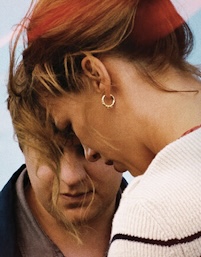Petzhold’s new film ‘Afire’ is his magnum opus

Christain Petzhold’s latest and greatest film yet, Afire (2023) opens with the slow, hypnotic song “In My Mind” by Wallners as the main character, Leon (played by Thomas Schubert), who gazes out the window of a moving car at the beautiful forests of Northern Germany.
This opening scene and music choice perfectly set the viewer up for a journey through complex character motives and internal tourmaline.
The first three quarters of Afire are a slow-moving drama that tiptoes along the border of being considered slow cinema. Despite the structure, it keeps the viewer completely rapt by its breathtaking cinematography and colors that are so bright they almost look like they’re on modern three-strip Technicolor.
In the last twenty minutes of this film, though, it takes an unexpected turn and barrels through its final act. This left me sitting on the couch in the dark as “in my mind” started to play again over the credits, wondering how the script could have abandoned its irresistible structure so quickly.
In Afire’s opening, Leon and Felix (played by Langston Uibel) are on their way to Felix’s family’s incredible beachside house on the Baltic Sea. Upon their arrival, they are greeted with the unexpected fact that they will be sharing the house with a young woman Nadija (played by Paula Beer).
This is Petzold and Beer’s third film collaboration. In Petzold’s last two films before this, Udine (2020) and Transit (2018), Beer plays a critical role in both plots, but you don’t ever get to know her as an actor as much as you do in Afire.
From the very first moment that we see Nadija through a bright white window frame, hanging up clothes in the garden, it’s obvious that Beer has an acute understanding of how to completely ignore the camera and get fully immersed in the world of her character.
Beer’s performance in this film is a standout not only because of her natural film presence but also because of the incredibly deep and versatile character that she’s built.
Beer and Schubert don’t have many verbal interactions until the second half of the movie, but when they do, they present an on-screen presence that just feels ‘easy’.
Leon’s antisocial awkwardness feels like it might make Nadija uncomfortable, but instead, it does the opposite and fuels Beer’s confidence in her role, and therefore Nadija’s confidence in herself.
Throughout the entirety of the movie, Leon is so antisocial and difficult to be around that he slowly pushes Felix farther and farther away from him. His inability to talk to people is very close to the way Delphine (played by Marie Rivière) in The Green Ray (1986), directed by Éric Rohmer.
Rohmer has been sighted as one of Petzhold’s most prominent influences, and Afire is the best example of how deep that influence runs.
From slow tracking shots of quiet beach conversations to the actual plot trajectory, The Green Ray and A Night at Maud’s (1969) feel like the building blocks of Afire.
Romer’s films are full of incredibly ‘human’ characters who make choices that the audience isn’t necessarily supposed to agree with. That is beautifully echoed in Afire with the main character Leon, who has more than a few flaws.
It is almost painful to watch having conversations with people just because of how out of touch he is with the world.
Leon’s character flaws continue throughout the entire hour and forty-minute runtime in a really smart way. In the most complicated and yet realistic way, Leon has no real character arch which consequently makes him a much more interesting character.
If Leon had some epiphany about his ways at the end of the film, it could have risked being corny. I believe that it was beyond a choice to choose to keep him as complicated as he is.
Overall Afire is a fascinating new film that trips in the execution of its ending, but while the weakness at the end of the script is slightly disappointing, it also cements Petzold as one of the most unique directors of our time.
His unconventional way of creating characters and plots that take completely unexpected twists and turns while still managing to feel perfectly plausible is an underappreciated skill in Petzhold’s repertoire.














